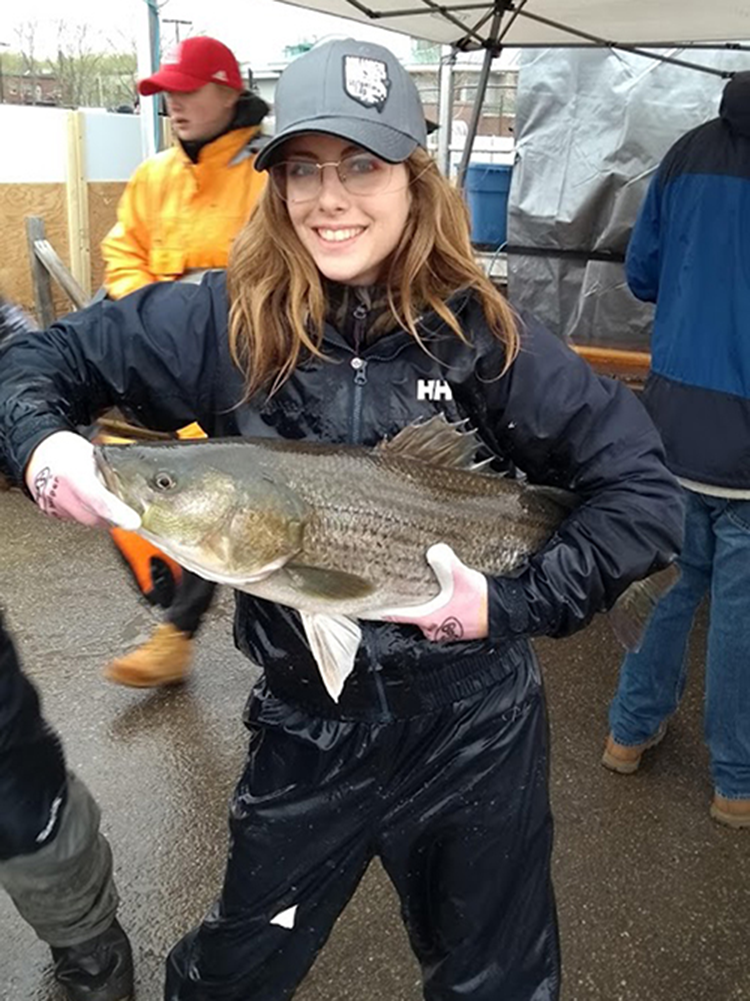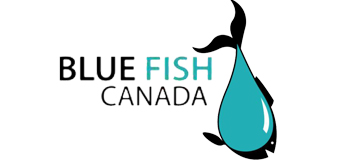Blue Fish News – July 19, 2020
In this July 19, 2020 issue of the Blue Fish Canada News we present:
- A 3-part Blue Fish Radio program exploring the recently launched Atlantic Angler Challenge;
- The latest fish and fishing news; and,
- Blue Fish Sustainable Hot Weather fishing tips.

Atlantic Angler Challenge
Professor Trevor Avery teaches and conducts fisheries research out of Acadia University in Nova Scotia. More recently he’s teamed up with Jeff Wilson of the Striper Cup and Sean Simmons of Anglers Atlas to form a ground-breaking recreational fisheries research initiative called the Atlantic Angler Challenge. The initiative rewards anglers to download and use the MyCatch app to track and report their angling pressure and success. Listen as professor Avery shares with editor Lawrence Gunther his rationale and expectations for the research that is now taking place across all four Atlantic provinces on this episode of Blue Fish Radio.
https://bluefishradio.com/atlantic-angler-challenge-rewards-citizen-scientists/
Professional Angler Jeff Wilson is the lead organizer and spokesperson for the Atlantic Angler Challenge. You might remember Jeff from previous Blue Fish Radio episodes when we featured his championing the Striper Cup tournament that takes place each spring on New Brunswick’s Miramichi River, and his herculean efforts to protect the return of native Striped Bass to Atlantic Canada. In this Blue Fish Radio episode we speak with Jeff about the logistics behind organizing the Atlantic Angler Challenge, and how it grew so quickly to cover all gamefish species in all four Atlantic Canada provinces.
https://bluefishradio.com/angler-incentives-and-the-atlantic-angler-challenge/
In our 3rd and final installment on the Atlantic Angler Challenge, we go back to an earlier episode of Blue Fish Radio featuring the founder and CEO of Angler Atlas and the inventor of the MyCatch angler app. Sean Simmons has been expanding the use of the MyCatch app as researchers everywhere learn of its many benefits for engaging anglers as citizen scientists. The app is now in use across Canada by scientists and anglers to track angler effort and capture rates, and is the app chosen by organizers of the Atlantic Angler Challenge. Listen as Sean speaks to Editor Lawrence Gunther about the origins of the MyCatch app, and his world-leading progress in advancing recreational fishing science-based fisheries management.
https://bluefishradio.com/nature-meets-shiny-tech-with-mycatch/
Fish and Fishing News
Fishing:
New statistics point to young adults taking up sport fishing – Castanet.net
The Freshwater Fisheries Society of BC says, unlike many outdoor recreational sports, fishing is on the rise this year. Resident angler license sales are 16 per cent higher than last year and total fishing licence sales are 3 per cent above 2019 sales, numbers that more than offset the loss of licences typically purchased by non-resident Canadian, American and international anglers in April and May.
Recreational Chinook fishing re-open in the Skeena watershed – My Bulkley Lakes Now
As of midnight July 15 the Department of Fisheries and Oceans has reopened fishing for Chinook salmon but additional measures have been put in place. According to the DFO, the maximum number of Skeena Chinook will be two in the Morice, Bulkley and Skeena rivers but only one may be over 65cm. The DFO also added certain tributaries and lakes will remain closed but sport anglers are being encouraged to look at the DFO’s website for a full list of closures.
Thousand Island Open Bass Tournament Cancelled
Organizers of the Thousand Island Open Bass Tournament had to make the difficult decision to cancel the 2020 TIO. The city of Kingston has put in place a limit of 100 total participants in the event, which would have limited the tournament to 50 boats. This limit would make it entirely unfair for organizers to prioritize 50 out of the 94 who registered for the event. entry fees will be refunded promptly. For more details contact Janet Eastman janet@hookset.com
Kootenay angler’s program off to a great start – Trail Times
The first lucky winner of the new Kootenay Lake Angler Incentive Program is local Dave Johnston from Grey Creek. In the first month of the program, there were 2,082 rainbow and bull trout heads submitted. The goal is to help with the recovery of the main lake kokanee population that has been severely depressed for nearly a decade due to an overpopulation of rainbow and bull trout. The Freshwater Fisheries Society of BC joined the program by providing funds for the monthly draw and the grand prize, and the Ministry of Forests, Lands, Natural Resource Operations and Rural Development and Jones Boys Boats at Woodbury Creek on the lake are also partners.
Barracuda caught in Vancouver Island waters – Mid Island Independent News
A Vancouver fisherman got a rare experience earlier this week while fishing in the Alberni Inlet.
La Onda Mila Named 2020 Blue Marlin World Cup Champions – In The Bite eNews
Capt. Marty Bates and the La Onda Mila team became this year’s Blue Marlin World Cup Champions after reeling in a 964-lb. blue marlin. Capt. Jason Buck and the Done Deal team earned the Big Blue Challenge for their 667.2 blue marlin.
Anglers Advised to Keep Fish Caught in Deep Water – Fishing Wire
The North Dakota Game and Fish Department encourages anglers to keep fish caught from depths of more than 25 feet, rather than practice catch-and-release. The N.D. fisheries management section says while catch-and-release is often encouraged under the right conditions, fish reeled in from this depth will likely die if released because of the extreme change in water pressure. Change in water pressure will cause the swim bladder to expand which means fish can no longer control balance. In addition other internal injuries are likely, such as ruptured blood vessels or internal organs. Because of these other internal injuries, biologists discourage fizzing, the practice of deflating the swim bladder.
Fish:
Protect Game Fish in Michigan – NPAA
Commercial fishing interests have turned their sights on Lake Michigan’s game fish species including yellow perch, lake trout and walleye. These species contribute to the $2.3 billion recreational fishing industry in the state of Michigan through the participation of 650,000 Great Lakes Anglers. The vast majority of the fish in the Great Lakes are managed by funding generated through the sale of recreational licenses, indirectly benefiting the commercial fishing industry.
Tracking the Great Lakes Sucker Run – IJC
Every spring, rivers and streams connected to the Great Lakes fill up with suckers to lay their eggs. This group of fish species is known for eating their meals off the lake bottom. They are not a popular game fish and may be regularly overlooked, but recent research shows they play an important role in the broader ecosystem. The Great Lakes are home to several species of suckers. Two are found in all five lakes in abundant numbers: the longnose sucker and white sucker.
New Brunswick orders smallmouth eradication project to register for environmental assessment – ASF
The latest curveball in the push to eradicate smallmouth bass from the Miramichi watershed came Monday. The province of New Brunswick ordered the Working Group on Smallmouth Bass Eradication in the Miramichi to register its plans for a potential environmental assessment.
How Do Low Lake St. Lawrence Water Levels Affect Fish Habitat? – IJC
Lake St. Lawrence is the portion of the St. Lawrence River above the Moses-Saunders Dam that was made artificially wider and deeper when the dam was built. The area is a destination for sport fishing, including an annual Bassmaster tournament. High flows through the dam in recent years to remove water from Lake Ontario have resulted in historically low water levels in this portion of the river.
Hiding in Plain Light – Hakai Magazine
A natural phenomenon of light and waves helps prey fish use stealth when running from predators. It’s one of those things that everyone recognizes, but no one really knows the name for: the quivering light cast by sunlight through waves that makes a net-like pattern on the bottom of lakes, oceans, or swimming pools. The phenomenon is called water caustics, and it may help some fish to escape predators.
Infectious salmon anemia will result in fish removal from Aquiculture site – ASF
The years long ISA outbreak in Atlantic Canadian aquaculture rolls on with the 13th detection of virulent infectious salmon anemia in southern Newfoundland since late 2017. More than 300,000 diseased fish will be cleared out and sold to supermarkets, adding to the millions affected so far.
Indigenous:
83 Pound Lake Trout Caught in Northern Canada – The Venatic
A monster lake trout that should have eclipsed world records was caught by fishermen and Canada’s Northwest Territories earlier this month. Hauled in by members of the Deline First Nation Tribe, the fish was caught by using a gill net as the fishermen were sustenance fishing. Their catch would have been placed in the record books had it been caught using rod and reel. The current record is a 72-pound lake trout established 22 years ago. The fishermen attempted to revive the fish and release it, but unfortunately it had already died.
To bring back endangered fish First Nation claims environmental management authority – Phys.org
Over 20 years ago, the Bella Coola River—located in southern British Columbia and central to the traditional territory of the Nuxalk Nation—saw its last healthy run of eulachon before populations dramatically crashed in 1999. A kind of smelt, eulachon are anadromous fish, which means they spend the majority of their adult lives in the ocean and return to their natal streams only to spawn and to die. A sovereign Indigenous or First Nation within what is known as Canada, Nuxalk people have maintained a strong relationship with the eulachon since time immemorial.
Water Quality:
Asian carps and the Great Lakes – FOCA
Did you know that vegetated nearshore areas would be the most vulnerable habitats, if Grass carp became established in the Great Lakes? Loss of nearshore vegetation would negatively impact your water quality because plants along the shoreline slow surface runoff and filter contaminants before they reach the water.
Deep Geologic Repository cancelled – FOCA
Plans for nuclear waste storage on the Lake Huron shore have been shelved. Ontario Power Generation has cancelled the Environmental Assessment and their application to the Canadian Nuclear Safety Commission for a construction licence for the proposed Deep Geologic Repository.
TAKE ACTION: Canada needs a strong policy on Non-Fuel nuclear waste
Canada does not have adequate rules in place to manage non-fuel nuclear waste. This kind of waste is planned to be stored in the Near Surface Disposal Facility at Chalk River, on the shores of the Ottawa River and just upstream of our nation’s capital. The international community has recognized that Canada’s policies for managing nuclear waste are inadequate. The Ottawa River Keeper is asking the public to share their concerns by signing their petition and contacting your MP
How does Covid 19 and recreational water mix? – CDC
According to the Centre for Disease Control (CDC), “there is no evidence that COVID-19 can spread to people through recreational water”.
Boating:
Jumbo Electric Outboards on the Way – Fishing Wire
Evoy says the 150-hp electric outboard is just the beginning. Following the introduction of its 150-hp electric outboard earlier this year, Evoy is planning to add more powerful all-electric engines in the future. The Norwegian manufacturer says it will add 300-hp and 450-hp versions with the 300 being available for pre-order in 2022. The 450 will follow with pre-order expected for 2024.
Business:
ICAST 2020 Virtual Sportfishing Showcase a Success – ASA
In response to COVID-19, ICAST, the world’s largest recreational fishing trade show, transitioned from an in-person show to a virtual event. The American Sportfishing Association produced the Show and delivered attendees and exhibitors alike an engaging, interactive virtual trade show experience. Editor Lawrence Gunther was one of the judges this year for the “best in show” competitions involving over 30 categories of fishing equipment. Visit the ICAST 2020 Online New Product Showcase to learn about all the amazing entries and category winners.
Will Your Next Salmon Come from a Massive Land Tank in Florida? – POLITICO
The so-called Bluehouse located in Florida is on track to become the world’s biggest land-based fish farm on a campus the size of the Mall of America. Over the next decade the farm will ramp up to producing a billion meals of Atlantic salmon a year. The operation is on schedule to begin delivering salmon to customers later this year. The Norwegian firm Atlantic Sapphire has moved its entire river-to-sea life cycle into indoor tanks, with the goal of supplying nearly half the current U.S. salmon market.
This Week’s Feature – Blue Fish Sustainable Hot Weather Fishing Tips
- Fish during the cooler early morning or at night when air and water temperatures are lower.
- Use appropriately sized equipment and land fish quickly to reduce fish fatigue.
- Keep fish in the water while removing hooks and while taking photographs.
- Ensure nets and hands are wet before touching fish.
- Revive fish before release by holding the fish upright, facing current, and as far below the surface as possible.
- Avoid angling in deeper river pools where fish have concentrated in cooler water.
- Fill your boat’s live-well during the morning in deeper cooler water and add only minimal ice to prevent excessive chlorine build-up from melting ice.
- Switch the circulation pump on your boat’s live-well to recirculate when travelling through shallow areas where water is hottest.
- Ensure fish are quickly returned to water with the depth and temperature from which they were caught.
- Fish for only those fish species that can be safely harvested when surface temperatures exceed 25 degrees C.
About us
You can read current and back issues of Blue Fish Canada’s Newsletters by visiting: www.BlueFishCanada.ca
For more about Lawrence Gunther, North America’s only blind professional angler, conservationist, writer, blogger, podcaster, film maker and TV personality, visit: www.LawrenceGunther.com
Gunther founded the charity Blue Fish Canada in 2012 and launched the podcast Blue Fish Radio in 2013.
Please rate The Blue fish Radio Show on Apple Podcast so others will learn of this unique Canadian resource by visiting: https://podcasts.apple.com/us/podcast/the-blue-fish-radio-show/id1090189487
Should you have a podcast suggestion or resource you would like to share, please send us a message to: admin@bluefishcanada.ca
Blue Fish Canada is a federally incorporated registered Canadian charity. Please consider making a small monthly donation to off-set the costs of this Newsletter and our other Blue Fish Canada programs by visiting: https://bluefishcanada.ca/donations/
 Blue Fish Canada/Poisson Bleu Canada
Blue Fish Canada/Poisson Bleu Canada
